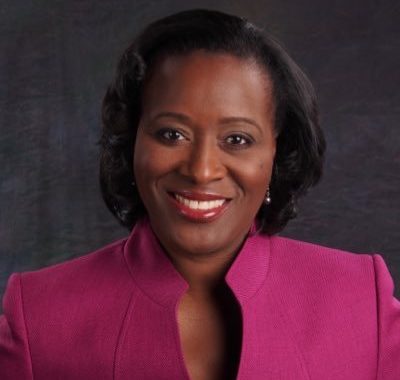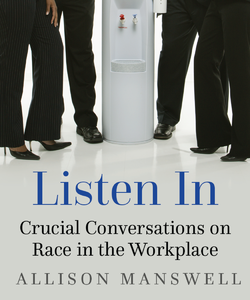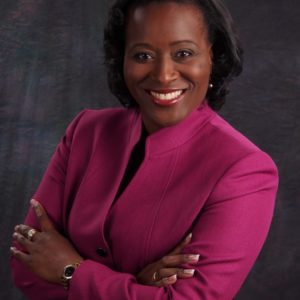Discover the importance of tailoring effective DEI strategies, debunking common diversity myths, and fostering inclusive workplaces that attract and retain diverse talent.

Listen In: Crucial Conversations on Race in the Workplace
A Conversation Between Allison Manswell and Chris Jones

Allison Manswell’s book, Listen In: Crucial Conversations on Race in the Workplace, was written in part, as her response to the Lean In movement. The book contains fictional conversations with others about race in the workplace and practical tips toward changing yourself and your organizational culture. Listen In: Crucial Conversations on Race in the Workplace was written after the mass shooting at a church in Charleston, and before the election of our current president.
Allison recognizes that crucial conversations on race at work can be awkward and difficult. She also recognizes that some individuals lack the personal and social awareness, relationship skills and emotional maturity to engage in a productive conversation about a sensitive topic. Her book isn’t for them. It’s for everyone else.
A lot has happened since 2015 in terms of race relations in society. #BlackLivesMatter on Main Street still has not yet translated to #BlackTalentMatters on Wall Street. Hate crimes are up significantly. And the pay gap between white men and all other groups is widening for everyone except Asians. Unconscious bias training continues to be seen as the universal band-aid, but we aren’t look at what is causing the wound.
Allison has a new perspective and a few answers.
Chris: Since the book was written, what are the big changes that you’ve seen?
Allison: The book was written before we began to turn the clock back on racial equity and has become even more relevant than ever before. People of color, specifically Black/African American people are finding themselves in situations that we now call ‘breathing while Black”.
Chris: I like to use the analogy that giving you power doesn’t take away any of my power. It isn’t pie.
Allison: Exactly. The book was written before we began the recent trend to turn the clock back on racial equity. As a result, it has become even more relevant than ever before. People of color, specifically Black/African American people are finding themselves in situations that we now call ‘breathing while Black’. The act of calling the police for simple life events is the anti-thesis of inclusion. It is an official statement that ‘you do not belong’. The other big change is that we are no longer having political conversations – we’re having humanity conversations.
A turning point for me was when I did an organizational assessment. This assessment tool looked looked at ten areas of differences that included political differences. I was hoping to use the data to create suggestions for how to manage our political differences in the workplace. Unfortunately – no strategies emerged from that project – although I did come up with two key insights:
- Major corporations and academia must step up and hold people accountable for behaviors that communicate ‘you do not belong’.
- I landed in a powerful place personally and professionally where I am open to having some conversations about political differences, but I refuse to sacrifice my humanity on the altar of diversity. Putting children in cages without soap or a toothbrush is an example. There must be a minimum standard for dialogue.
Allison’s views are deeply rooted in the James Baldwin quote:
“We can disagree and still love each other unless your disagreement is rooted in my oppression and denial of my humanity and right to exist.”
Chris: You’ve been giving “Connecting Beyond Differences” skill building workshops based on your book. What is the typical experience?
Allison: The typical experience is that people realize that when I understand someone else’s perspective and chose to activate empathy – that the nature of the difference is actually smaller than we thought.
Chris: Have you noticed any trends?
Allison: Yes. People need to leave toxic workplaces at a faster rate. When it is awful, get out. If the workplace is not servicing you, and you aren’t being valued, and you can’t bring your authentic self to work – then leave. Many people stay too long. When people stay, they aren’t helping the greater group. It is an act of love to keep yourself healthy and whole, that’s your first responsibility. Your second responsibility is to the greater good.
Chris: What workplace tips do you have?
Allison: The book recommends that the first step in having these conversations is to acknowledge that we aren’t all having the same conversation and we need to stop pretending that we are. So, I offer two sets of tips: “Working While White” and “Working While Black”.
Tips for Working While White
[A selection of the tips is shown below.]- Seek first to understand. Take a moment to breathe and be present in the reality of why race continues to be an issue in the U.S. As uncomfortable as it is, can you intuitively feel what the experience looks like and feels like for non-white people? Consider for a moment that Eric Gardner died pleading to have the breath that you just took and those guilty of mass shootings are taken regularly taken into custody without incident Learn what the key issues are.
- Assume that Black people would prefer not to have the struggle. Assume they would prefer not to worry about their safety, they would prefer a level playing field at work and would prefer not to have to talk about race in the workplace. Assume that this entire situation is as awkward for them as it is for you.
- Help your colleagues trust that you truly ‘do not have a racist bone in your body’ by demonstrating your compassion by breaking the silence. Notice when your compassion is necessary and when your silence indicates that you agree with the injustice.
 Tips for Working While Black
Tips for Working While Black
- Seek first to understand. Be empathetic to the guilt and shame that causes race to be such a difficult topic for white people to engage around.
- Learn to discern what to ignore. Use your judgement to operate somewhere between dangerously dismissive and appropriately direct. Letting everything slide doesn’t benefit the rest of us. At the same time, not everything is worth following up on.
- Know when to leave a toxic work environment. Sometimes we stay too long. Remember your first responsibility to your own well-being and career development. Seek out the right resources and leave if you aren’t able to solve for the issues you are experiencing.
 Allison Manswell, MBA, CPLP, author of Listen in: Crucial Conversations on Race in the Workplace, has 20 years of experience in employee, leadership and organizational development. For more information or to contact Allison Manswell visit www.AllisonManswell.com
Allison Manswell, MBA, CPLP, author of Listen in: Crucial Conversations on Race in the Workplace, has 20 years of experience in employee, leadership and organizational development. For more information or to contact Allison Manswell visit www.AllisonManswell.com
Chris Jones is a Founding Partner of Spectra Diversity, creator of the only



